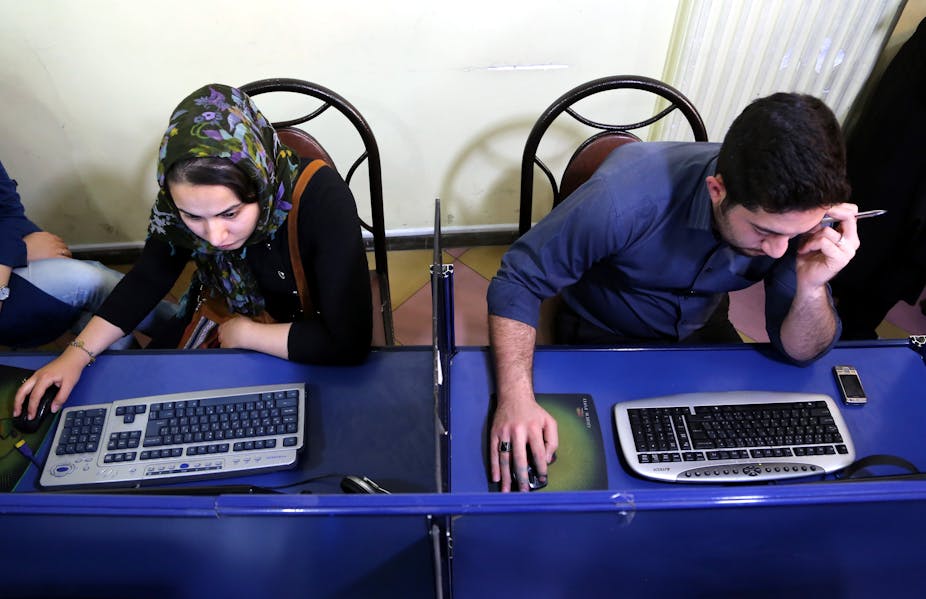The founder of free online learning platform edX, set up by Harvard and the Massachusetts Institute of Technology (MIT), has spoken out against the US State department’s decision to block people in Iran, Cuba and Sudan from accessing a new advanced course on aircraft design.
“I believe that all our courses should be freely available. I believe it does not make sense to block any courses from embargoed nations,” said Anant Agarwal, president of edX and professor of electrical engineering and computer science at MIT.
In early March, edX discovered the US government was going to block the Flight Vehicle Aerodynamics course offered by MIT. “Right now on EdX, of the 160 courses on our platform, one course is blocked, that’s the advanced aeronautics course to the embargoed nations.”
Agarwal, speaking at the Global Education and Skills conference in Dubai, said it was “possible that certain other very advanced courses might be impacted”.
Other US-based providers of massive online learning courses – known as MOOCs – such as Coursera and Udacity have already had their courses blocked from students in nations under US sanctions.
But Agarwal said edX had been working closely with the state department and received a licence last year to offer courses in these embargoed nations. Agarwal had written a blog in early February saying edX was not blocking anyone. The aeronautics course is the first one to be blocked.
“I think it really comes down to not transferring technologies that could cause grave harm to the US in a military sense,” Agarwal said. But he added that much of the information in the course is freely available on other open learning platforms anyway.
“We continue to work diligently with the state department to try and make all courses freely available with everybody.”
A different approach
In the UK, where MOOCs are at an earlier stage of development, there has not yet been any censorship from the British government, according to Mike Sharples, chair in educational technology at Open University and the academic lead at FutureLearn, a private company owned by the Open University that offers online courses.
“The UK government has not placed any restrictions on FutureLearn making its courses available in any countries, nor has there been any indication, of which I’m aware, that it may do so in the future,” he said.
“In the hypothetical event that any FutureLearn courses were blocked by the UK government, as an organisation operating in the UK, FutureLearn would comply with the UK laws and work to find a solution which make it possible for us to continue making our free online courses available to learners around the world.”
Ways around censorship
Agarwal said internet censorship in countries such as China, Syria and Pakistan, also meant that some parts of edX courses delivered on platforms such as YouTube had been blocked to students.
To get around this, in China edX has secured some of its local partners to act as alternative hosting servers for content. This had also lead to problems. “We have seen examples where certain hosting providers in certain nations were uncomfortable hosting certain types of courses for fear that the government would shut them down,” Agarwal said.
Sharples said as far as he was aware, “no other government has blocked access to FutureLearn courses.”
Alison Littlejohn, director of the Caledonian Academy at Glasgow Caledonian University and an expert on MOOCs, said, “Censorship is not new and existed long before the invention of the web.”
“One hundred years ago ‘world service’ radio stations were set up as a way to give a country an advantage in a war situation and these were viewed form of cultural imperialism. Some countries interrupted the broadcast while others set up their own ‘world services’.”
“Web censorship is a daily aspect of life in many countries. Censorship can be viewed as a counter to western propaganda and enculturation and is sometimes positioned by governments as a means of ‘protecting citizens’,” she said. She suggested an alternative strategy would be for MOOCs to be grounded in diverse cultural perspectives.
“While the philosophy behind MOOCs is that they are ‘open to all’ there has also been criticism that the main providers of MOOCs have been from universities in English-speaking countries. Consequently, the knowledge and culture of these courses may have a bias.”
“This criticism is not only from Iran, Syria and Cuba but also from various European countries, particularly those where English is not the first language,” Littlejohn said. She suggested one solution would be to offer MOOCs in different languages, reflecting different cultures and knowledge from around the world.

